- Home
- Julianna Baggott
Girl Talk Page 2
Girl Talk Read online
Page 2
The summer my father had an affair with the redheaded bank teller, 1985, my parents had been married for nearly sixteen years. We lived in a nice Colonial house on Pako Avenue in Keene, New Hampshire. They’d met at Guy and Juniper Fiske’s wedding on Cape Cod. My mother doesn’t dance and my father had lost a leg early in the Vietnam War, and so they met at the punch bowl. They knew right from their very first encounter that they were going to get married. My mother strolled out of the reception on my father’s arm, and just before Juniper drove off with Guy in his father’s antique roadster, she thanked Juniper, as if my father were a large, overly lavish party favor. My parents were married two weeks later by a justice of the peace. She’d grown up the daughter of a fish-shop owner in Bayonne, a quick ride from New York City. She’d told me that my grandfather died of a heart attack shortly before their wedding and my grandmother died shortly thereafter from what, in retrospect, seemed to be a suspiciously generic and vague illness. She said she’d already begun to feel like an old maid. It was 1969. My father was twenty-four and she was twenty, ten years younger than I am now.
I’m sure there were some snags in the marriage, but at fifteen I wasn’t aware of them. I can recall only that my mother didn’t like the way my father whistled while washing his hands in the bathroom and that he complained her perfume was asphyxiating. Aside from these minor annoyances, they seemed happy. I remember seeing them kiss under mistletoe. They linked arms when out walking in town. But I didn’t know anything, really, about my mother then.
It was all a surprise to me, beginning that one night when I stumbled from bed, a gawky fifteen-year-old girl (back when gawky was just on the verge of being sexy, but not quite yet) and found my mother in the kitchen, wearing a black bathing suit, standing in the glow of the refrigerator light. She was bent over, leaning in, her head slightly lifted to cool her neck. I can still see her lit up in the refrigerator in that pose, like an immodest starlet on an otherwise dark stage. She was thirty-five and buxom and had full red lips and slightly buck teeth. She’d been weighing her food for a month or so on a little Weight Watchers scale, eager to take off some of her extra padding, but I was jealous of the padding, the soft breasts and full rump. I was all limbs and had already spent many hours that summer eating peanut butter straight from the jar with a spoon, trying not to move, so I could put on some weight, willing it to just the right places, with no luck.
I was used to my mother, on her sleepless nights, rousing me from bed—purposefully dropped toilet seats, ignored kettle whistles—for “girl talk,” as she put it. It was a term that by the time I got to college with my newfound feminism, I would find insulting, demeaning. I’d see it as a generational distinction between us. I remember constantly reminding her that the women who worked for my father were adults, that calling them girls made them sound like their mothers dressed them every morning in little lacy dresses, shiny Mary Jane shoes, their hair in Bopeep curls. But at fifteen, I loved the idea that my mother and I were equals. And now, looking back, I’ve come to love the words she chose offhandedly, because I think that in many ways, especially this one summer, we were both still innocent, each on the verge of becoming someone else or, maybe more accurately, growing more into ourselves.
Of course, my father, as a gynecologist, might have been the better choice for teaching me the anatomical goings on of my body. My dad had been raised in Boston by an uptight circle of women: his mother, whom I called Tati, and an unmarried aunt, whom I called Bobo, along with his three primly unattractive sisters. The Vietnam War had been his first experience living with men, aside from a scout camp where he’d lit firecrackers behind the scout leader’s back and was sent home in shame, his eyebrows singed. I imagine he decided to be a gynecologist as a retreat, in a way, back to the gentler organs of the female body and the more protected world of his childhood. Despite his expertise in female anatomy, however, my mother never relinquished what she thought of as an educational duty. She was passing on a lifetime of womanly experience and found my father wholly unfit.
“My God, Lissy,” she liked to say, “he’s a dentist with no teeth, a psychologist without hang-ups. Would you trust a blind eye doctor?” I loved it when she talked to me this way, lowering her head, with her eyebrows lifted, her eyes half closed, the same way she talked to the ladies at the Keene Country Club. I loved it because I was a lonely kid, I guess, restless and bored. I loved my mother’s confidential tone, even though at this point she hadn’t really begun her confession spree. And I listened to her. I soaked her knowledge up like a dutiful sponge, tagging and filing all her little tips that I now find myself referring to as if they were scientifically proven, forgetting their offhanded, often illogical origins. For better or for worse, my dentist has teeth, my eye doctor has eyes, the only psychologist I ever had was insane, and my gynecologist has a vagina.
But I have to say that up until this one summer night in 1985, my mother’s girl talk had been vague and generic. She’d told me not to sit on boys’ laps because it gave them stomachaches; she’d mumble “blue balls,” a term that, left undescribed, made me envision fragile Christmas decorations. When I got my period for the first time, she laid out all of the necessary hygiene items on my bed, a box of pads and tampons, even a pair of my underwear with a pad already in place. (Evidently, she’d been prepared.) She gave me a hand mirror to help me figure out where a tampon should go, and then she held me for a moment by the shoulders, looking deeply into my eyes. She tilted her head and smiled, then turned, picking up a basket of laundry, and left the room. She preferred to discuss the polishing aspects of lipstick. Occasionally she’d allude to sex and womanly issues, but she told distant blurry stories as if she didn’t have sex and she wasn’t a woman, really, but she had a good friend who did and was. I could tell that she wanted to give it to me straight, but she was a converted New Englander, tight-lipped and rigid, and, as in any arena, the converts are always the most firm in their beliefs.
That night when she heard me shuffle into the kitchen, she straightened up. “Do you think this suit is flattering?” She swiveled and pivoted, asking in a tone that suggested midday, ignoring any hint that she might have awakened me, no “Did I wake you?” or “Oh, you’re up, too?” It was the beginning of summer vacation and, without the threat of early morning wake-up, the breakfast scramble and busstop hustle, there was no reason, really, not to be awake.
I told her that it was okay, but she didn’t seem convinced and she shut the refrigerator. I reached for a plastic-coated kitchen chair in the dark and sat down, pulling my bony knees up into my T-shirt, where they stuck out in place of breasts, a knobby shelf for my elbows. I was ready for her to start our regular lessons. But this time, she lit a cigarette—an occasional weakness about to become more than occasional. The kitchen was dark, a little light thrown in from the hall. The struck match lit her face for a second. She sat down at the table and said, very calmly, almost sweetly, “Your father, the bastard, is sleeping with a redheaded bank teller in Walpole. What do you propose we do about it?”
I wasn’t altogether shocked by my mother’s language. After all, no one can absolutely shake her roots. I certainly haven’t. I had imagined her upbringing in Bayonne, her father’s fish shop on Avenue C, where he’d made enough money to send her to a convent school for her last two years of high school and then on to Simmons, a pristine women’s college in New England that tidied up anything overlooked by the nuns. But sometimes when she was angry or chewing gum, she became the fish-shop owner’s daughter from Bayonne. This was one of those moments. She sat down and pushed back a cuticle with her thumbnail, waiting for my answer.
Once I had finally processed what my mother had said, my first reaction was disbelief. My father seemed too clumsy to be a doctor, much less to have an affair. Sex alone seemed thoroughly complicated to me, but to have it with someone with unfamiliar parts seemed nearly impossible. He seemed to lack both the necessary coordination and bravery. My mother once moved a coffee table thr
ee inches farther from the sofa and my father repeatedly nicked his wooden shin, and the real one was bruised for weeks. He was completely unhandy—and handiness seemed necessary, for some reason, in pulling off something like an affair.
“He doesn’t even have a toolbox.” It was all I could think to say. “He keeps his screwdrivers in a cut-open milk container. Are you sure he’s having an affair? How do you know?”
“He’s your father. He gets frazzled pumping gas. You can imagine him in the midst of an affair.” She sat down and crossed her legs. “He’s all but written it in lipstick across his forehead.”
Strangely, I didn’t think my father was immoral. I didn’t think of sin or anything of that nature. My mother was fairly religious, not above taking the Lord’s name in vain, but a constant at weekly Mass and confession. The nuns at the convent school had made an indelible impression. She didn’t speak of them often, but when she did, she was reverent. My father, on the other hand, was moderately religious, less likely to swear, but also less likely to attend church, and as far as I know, he never went to confession. We’d always attended a cinder-block church decorated in the fallout from the ’60s, orange shag carpet, abstract renditions of the stations of the cross—spiders on purple felt—and a chubby Jesus that a parishioner-artist had volunteered to do for the cross, his loincloth so skimpy that whenever I looked up, I felt dirty, as if I were trying to catch a glimpse up his skirt and fearful, too, of what might pop out. In the church’s basement, I attended the mandatory CCD classes where I was taught the Hail Mary before I could read. There was a posterboard with pictures of hailstones and the Virgin Mary and because someone didn’t know how to draw grace, there was a picture of grapes. And we recited: “Hail, Mary, full of grapes.” I went through a devout stage at thirteen, when I was confirmed. I chose Joan of Arc for my confirmation name. In the eyes of the church, my name is Melissa (Lissy) Katherine Joan of Arc Jablonski. The three other girls in the class chose Theresa, as in the Little Flower of Jesus, but she was much too subservient for my taste, finding God while scrubbing floors. But somewhere between my grandiose confirmation at thirteen and the summer of my father’s affair when I was fifteen, my religious fervor began settling into murky disinterest, which has since turned into a detached appreciation for my failed attempt at spirituality. I thought that my father’s affair was scandalous, incredible, but I wasn’t really thinking of it as unethical. However, because of my religious upbringing, I felt comfortable thinking that his affair was so unbelievable that it was nearly miraculous.
Often when I’m remembering my fifteenth summer and, especially, this one particular night, it’s as if my mother and I are underwater. The kitchen takes on that thick, underwater feel, that slow, unsyncopated sinking. My mother and I are not strong swimmers. She learned eventually at the convent school to frog-kick with her neck stretched away from the surface like a collie’s. And on summer vacations at Lake Winnipesaukee, she taught me the same awkward stroke. I can still see my father, a non-swimmer, on the dock, basking in a foldable aluminum lawn chair, his stump dangling, his fake leg propped idly against the arm of the chair, his good leg resting on its heel. My mother stands breast-deep, her shoulders pink from sun, pinched by the thick straps of her suit, her painted toenails dusted in lake silt. She waits for me, with her arms outstretched, to tip off the sandy shore and paddle into deeper water; my legs churn frantically beneath me, my hands pawing. I had always feared slipping under and settling on the bottom of the silty lake, and this is what I feel in the kitchen, underwater, next to the luminescent refrigerator and under the slow-motion ceiling fan. And although we were sitting there calmly, it’s as if my mother and I are holding our noses, the air tight in our lungs, our clipped heartbeats racing in our ears, the panic of the water pressing in.
I remember I asked her straight out, “Do you love him?” I asked it because it seemed like an adult question, and I very much wanted to be adult or, at least, to have my mother respect me like one. And I needed to know. It seemed the most important thing.
My mother stopped and stared at me. On the one hand, she was the fish-shop owner’s daughter, the girl who grew up in Bayonne, hard, no-nonsense, the identity she wanted desperately to shed but never really could, and on the other hand, she was the person she dreamed of becoming, that she was promised she could become, the person that I’d believed her to be, for the most part, when I was fifteen: the type of woman who taped down her nipples with Band-Aids under strapless evening gowns, who taught me how to pee without making a tinkling sound, who still believes that a woman should reveal as little as possible about herself. And yet this was when she started to crack; this was the moment, if I were pressed to choose one, that she decided to go ahead and reveal everything, and there was no turning back.
Her cigarette shook between her fingers, her eyes shimmered, and she whispered—almost mouthed, “He breaks my heart.”
2
It was nearly midnight by the time we pulled on to Route 12, heading north, and the summer air pouring in the car windows was cool. Walpole was only a half hour away, and we zipped along in the blue station wagon, each streetlight pulsing over the car.
“In the old days,” my mother said, pushing the cigarette lighter, “you waited till they were drunk, tangled up in bed sheets, and you beat the hell out of them with a cast-iron frying pan, or, depending on your class, a polo mallet.” She sighed. “Of course, my mother never had this problem. My father was a sap. My mother was a drunk with a mean, superstitious heart. She beat on him all right, but she didn’t need a frying pan.”
My mother almost never spoke of her parents, so I was surprised to hear them described this way—or any way at all. I’d never given them much thought. There was a black-and-white picture of them in the living room, a man with a push-broom mustache, a somber woman with light brown hair and a small, tight mouth. They were smudgy and small and collected a good bit of dust. I had imagined if they’d been alive, they’d have looked like typical grandparents, talk about phonographs, and wear cardigans; that maybe he’d have taught me to bait a hook and she’d have taught me to cross-stitch. But because I had little interest in fishing and needlework, I’d decided I hadn’t been cheated out of much by their early deaths.
“They seemed nice, in their picture.”
“Do you believe everything you see?”
I didn’t respond. It wasn’t really a question.
At the time, I didn’t wonder why my mother had brought me along. She’d presented it as family business, the way she consulted me on the color of new carpeting when it was really her decision entirely. I also didn’t ask where she’d gotten the address of the redheaded bank teller. In retrospect, I wish I had, because I was young enough to get away with that kind of question. Now it’s a gaping hole in the story. I assume that it was a piece of information that wound its way from secretary to neighbor, from teller to customer, from this source to that, until there were so many ways for it to travel to my mother that it was just a matter of time.
That night, however, I was concentrating on the image of my father in bed with a redheaded bank teller. I was trying to piece it together with things I’d read in Judy Blume books and seen in bits and pieces in the movies, Summer of ’42 in particular. But as soon as I saw the faceless woman loosen his tie, I was stopped by the saggy skin at his throat. As soon as he took off his trousers, I was stopped by the sock garter on his real leg and the pinkish shine of the fake one. For a long time growing up, I thought my father had actually lost his leg in Vietnam, that he’d misplaced it, hopped off, and left it behind, and I remember being aware of my body as a child, in a way other kids probably weren’t, on shopping trips around town, taking quick inventories of my limbs. But I wasn’t really afraid of losing a part of myself. I knew that I could just get another arm or leg, just pick up a spare on one of my mother’s errands. Eventually, I realized that my father’s leg hadn’t been left behind like a sock forgotten under a motel bed, that it probably had been
blown off while he was hauling bodies away on stretchers, but he never spoke of it. I began to envision the leg that used to hang below his calloused stump, his youthful leg with its fine blond hair. I tried to imagine him rounding bases, taking stairs two and three at a time. By my fifteenth summer, I’d become afraid of the fake leg, how it suddenly appeared, sticking out from behind a sofa or leaning casually against a wall, like a predator, part of a lover that might take me one day, and also like loss. In any case, no matter how much I tried to envision my father in bed with the redheaded bank teller, my father was still my father—the man who took pride in a straight hedge and an evenly sodded lawn, a gangly gynecologist with a lopsided grin and hobbled gait, a wobbly tune whistler.
“Why would he have an affair?” I asked.
She lit up, took a drag. Smoke curled up from her nose. “The man has women undress for him all day long. He’s bound to slip.”
I cringed. I’d been to his office only as a visitor, not a patient. I’d seen the legless, headless, bloodless model of a woman’s body cut open and with moveable parts, the tissue paper-covered tables, the silver stirrups. I’d opened the thin drawers filled with shiny instruments and had spun around on his little seat on wheels. I knew that women came in and he examined their privates, but I decided to focus on the large standing lamp with its wide bulb, which helped me pretend that his job had more to do with warming baby chicks than staring at vaginas.
“Really? You think she’s a patient?”
She nodded. “He’s a very handsome man, you know,” she said. “I just wish I’d been prepared.”
“How?”
“Oh, God,” she said. “I’ve had my opportunities. Frank Mertog has been after me for ages.”
“Oh,” I said. “His daughter, Linda, wears a lot of eye shadow. She globbed it on all last year during social studies.”

 Burn
Burn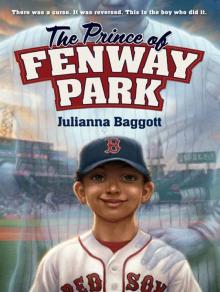 The Prince of Fenway Park
The Prince of Fenway Park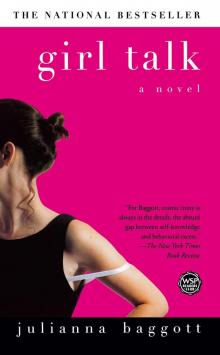 Girl Talk
Girl Talk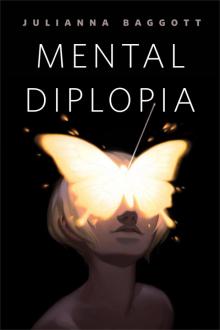 Mental Diplopia
Mental Diplopia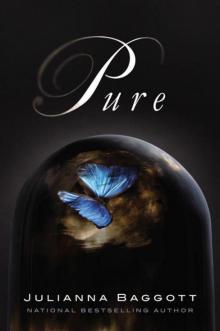 Pure
Pure Harriet Wolf's Seventh Book of Wonders
Harriet Wolf's Seventh Book of Wonders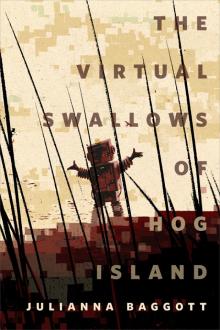 The Virtual Swallows of Hog Island
The Virtual Swallows of Hog Island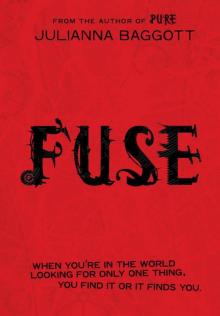 Fuse
Fuse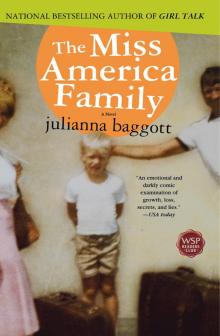 The Miss America Family
The Miss America Family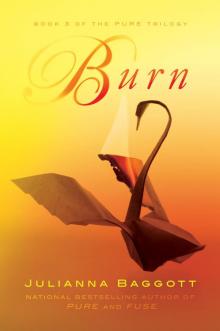 Burn (The Pure Trilogy)
Burn (The Pure Trilogy)